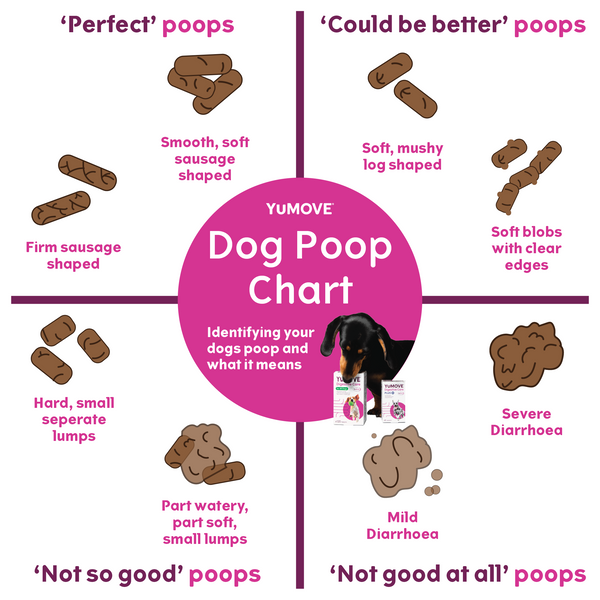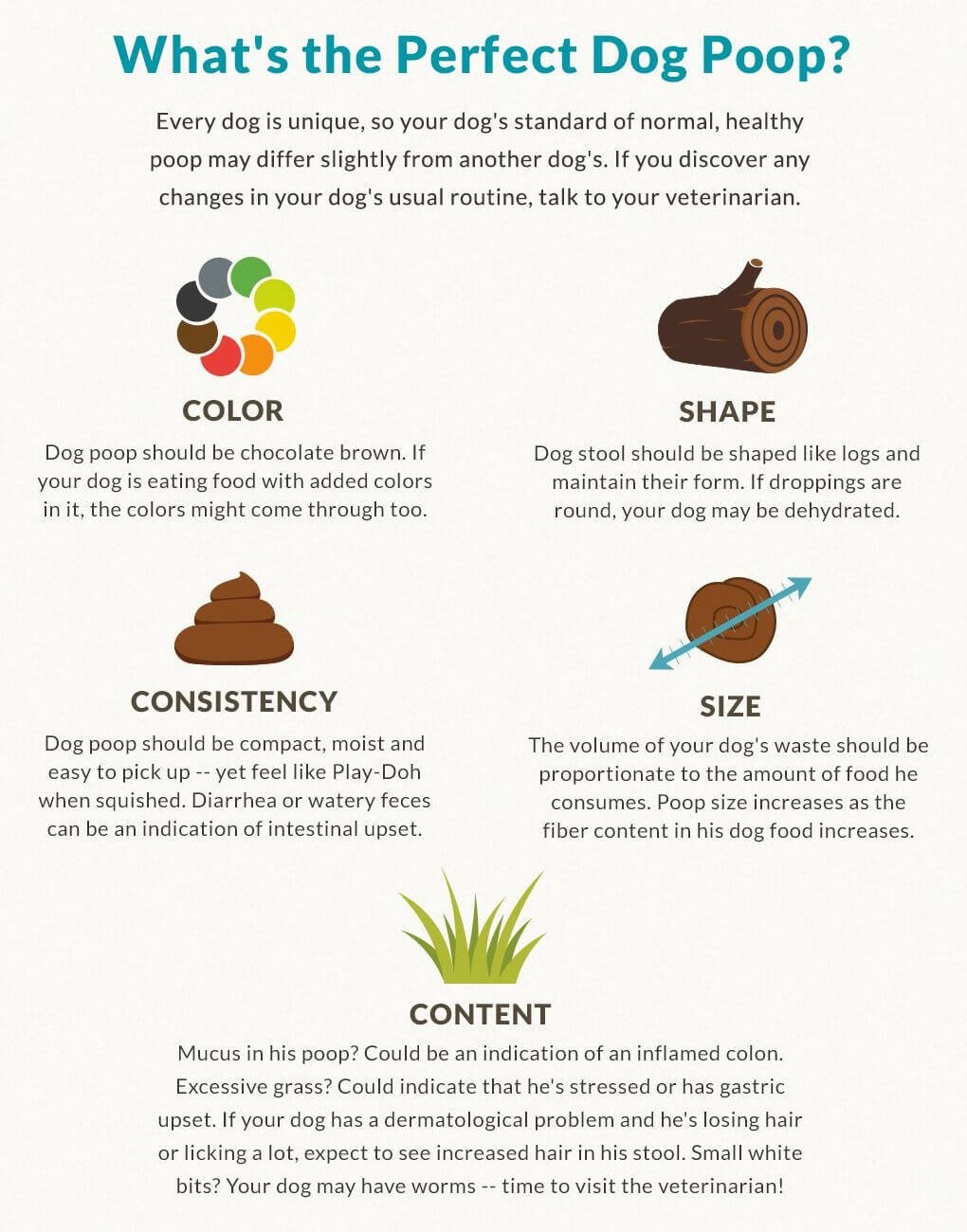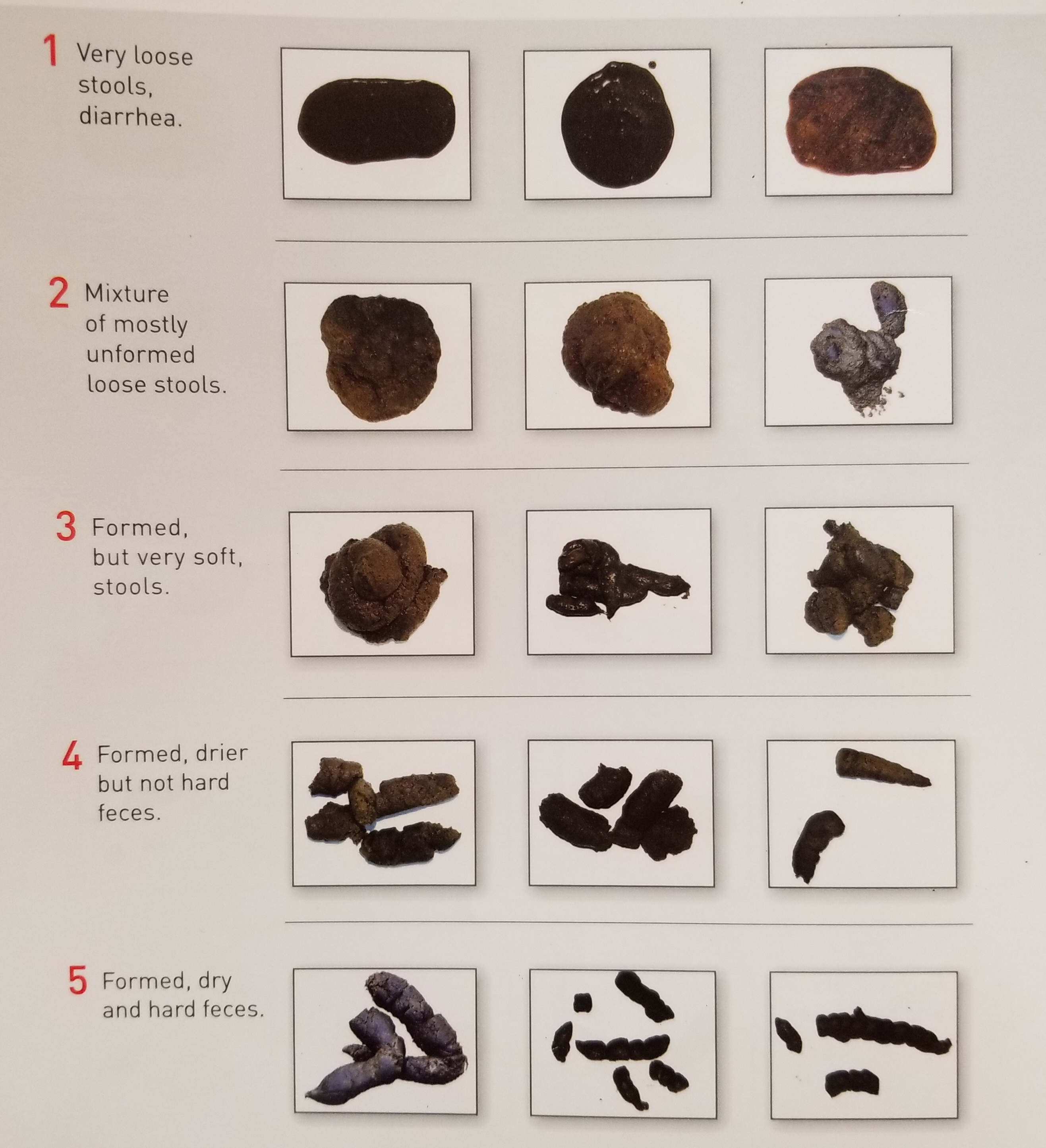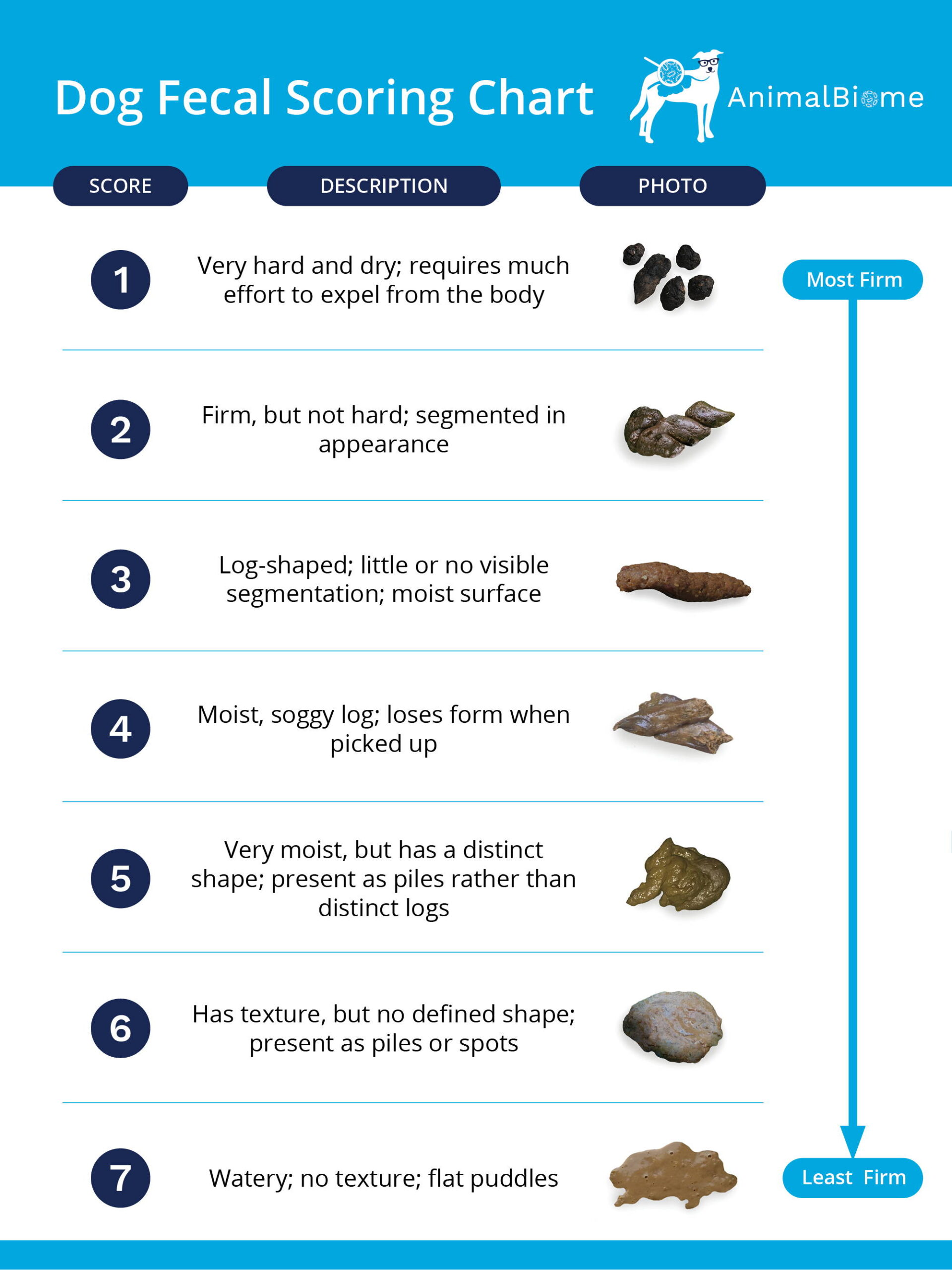Soft stools in dogs can be caused by overeating, so it is important to adjust their portions. Other potential causes include food sensitivity, abrupt food changes, and illness.
Properly identifying the underlying cause will help in finding the appropriate remedy to firm up the dog’s stools. Consulting a veterinarian and considering factors like diet, stress, and other symptoms can provide insight into the root cause and guide in finding a solution.
Ensuring that the dog is not being overfed and maintaining a consistent diet can contribute to healthy bowel movements. Additionally, adding fiber and probiotics to their diet, as well as avoiding human foods, can help normalize the consistency of their stools. Regular monitoring and appropriate adjustments will promote digestive health in dogs.

Credit: yumove.co.uk
Common Causes Of Soft Stools In Dogs
Overfeeding
Overfeeding is one of the most common but under-recognised reasons for soft dog poop. It can very easily put extra demands on the digestive system, leading to loose stools. It’s essential to feed your dog according to their specific dietary needs to avoid this issue.
Dietary Sensitivities
One of the most common reasons for diarrhea in dogs is dietary sensitivities. Sudden changes in diet or an intolerance to certain ingredients can lead to soft stool. A bland diet or elimination to identify the culprit can help manage this issue.
Stress And Anxiety
Runny poop can be a result of stress, medication, eating new food, or food that’s intended for humans. It can also be a sign of infection or an underlying health problem. Managing your dog’s stress levels and providing a consistent environment can help prevent soft stools related to anxiety.
Parasites
Parasites such as worms can cause soft stools in dogs. Regular deworming and proper hygiene practices can help prevent parasite-related diarrhea and maintain your dog’s digestive health.
Food Allergies
Food allergies can lead to digestive issues, including soft stools, in dogs. Identifying and eliminating the allergen from your dog’s diet is essential for managing this condition. A consultation with a veterinarian can provide specific guidance on managing food allergies in your dog.

Credit: www.purina.co.uk
Identifying Soft Stools In Dogs
Identifying soft stools in dogs is essential to understanding the underlying causes and providing appropriate care. Soft stools, often referred to as diarrhea in dogs, can be indicative of various health issues and dietary concerns.
Texture And Consistency
The texture of a dog’s stool can help provide insights into their digestive health. Normally, a healthy dog’s stool should be well-formed, neither too hard nor too soft. When the stool is soft, loose, or runny, it may indicate underlying digestive issues or dietary problems.
Color
Noting the color of your dog’s stool is important as it can provide valuable information about their health. In general, the color of a healthy dog’s stool should be brown. Any deviation from this color, such as black, red, or tarry stool, could indicate potential health issues and requires immediate attention.
Frequency
Monitoring the frequency of your dog’s bowel movements is vital when identifying soft stools. If your dog is experiencing frequent loose or runny stools, it can indicate an underlying health problem. Conversely, infrequent bowel movements may also be a cause for concern and should be addressed promptly.
Accompanying Symptoms
Aside from the texture, color, and frequency of your dog’s stool, it is also crucial to watch out for accompanying symptoms. These can include vomiting, lethargy, loss of appetite, and abdominal discomfort. These symptoms, when present alongside soft stools, can provide important clues about the underlying cause of the issue.
Effects Of Soft Stools On Dogs’ Health
Soft stools in dogs can have various effects on their health. It is essential to understand the implications of this common issue to ensure the well-being of your furry friend.
Dehydration Risks
Soft stools can lead to dehydration in dogs due to increased fluid loss through loose stools. Dehydration can be concerning and may require veterinary intervention to restore the dog’s fluid balance.
Nutritional Deficiencies
Soft stools may indicate nutritional deficiencies in a dog’s diet, such as lack of fiber or improper digestion of certain nutrients. Ensuring a balanced and appropriate diet is crucial for maintaining the dog’s overall health.
Impact On Digestive System
Constantly having soft stools can impact the digestive system of dogs, leading to discomfort and potential digestive issues. It is essential to address the underlying causes to prevent long-term damage to the digestive tract.
Behavioral Changes
Aside from physical symptoms, dogs with soft stools may exhibit behavioral changes such as decreased activity, lethargy, or increased irritability. Monitoring your dog’s behavior can provide insights into their overall well-being.
Diagnosing Soft Stools In Dogs
Soft stools in dogs can be caused by various factors such as overeating, food sensitivities, abrupt food changes, or even underlying illnesses or allergies. It is important to monitor your dog’s diet and make necessary adjustments to help their stools return to normal.
Consulting with a vet can also provide guidance on how to firm up your dog’s stool.
Veterinary Examination
If your dog is experiencing soft stools, it is recommended to schedule a veterinary examination. A thorough physical examination by a veterinarian can help identify any underlying health issues that may be causing the soft stools. During the examination, the veterinarian will assess your dog’s overall health and may ask about their diet, recent dietary changes, and any other symptoms they may be experiencing. This information will help the veterinarian determine the appropriate diagnostic tests to perform.
Fecal Tests
Fecal tests are commonly used to diagnose soft stools in dogs. These tests involve analyzing a sample of your dog’s stool to check for the presence of parasites, bacteria, or other abnormal elements. The veterinarian may look for common parasites such as roundworms, hookworms, or Giardia, as these can cause soft stools. They may also test for bacterial infections or signs of inflammation. Fecal tests can help determine the underlying cause of your dog’s soft stools and guide the appropriate treatment.
Allergy Testing
Food allergies or sensitivities can also lead to soft stools in dogs. If the veterinarian suspects a dietary allergy or sensitivity, they may recommend allergy testing. This can be done through blood tests or elimination diets. Blood tests can identify specific allergens that may be causing an allergic reaction in your dog. Elimination diets involve removing certain ingredients from your dog’s diet to see if their symptoms improve. If a food allergy or sensitivity is identified, the veterinarian will guide you on selecting an appropriate diet for your dog.
Blood Work
Performing blood work can help identify any underlying health issues that may be contributing to soft stools. Blood tests can provide valuable information about your dog’s organ function, hormonal balance, and immune system. Additionally, blood work can help detect any systemic infections or abnormalities. By analyzing the blood work results, the veterinarian can get a comprehensive picture of your dog’s overall health and determine if any additional treatments or interventions are necessary. Diagnosing the cause of soft stools in dogs requires a comprehensive veterinary examination, including fecal tests, allergy testing, and blood work. These diagnostic tools help identify any underlying health issues, parasites, allergies, or food sensitivities that may be contributing to your dog’s soft stools. By correctly diagnosing the cause, appropriate treatment can be administered to alleviate your dog’s discomfort and promote their overall gastrointestinal health.
Treatment Options For Soft Stools
Soft stools in dogs can be a common and concerning issue for pet owners. Addressing this problem promptly is essential to ensure your furry friend’s health and well-being. Here are some effective treatment options for managing soft stools in dogs:
Dietary Modifications
Research shows that dietary changes can significantly impact a dog’s stool consistency. Transitioning your dog to a high-fiber diet may help regulate their bowel movements and firm up their stools. Additionally, avoiding human food and sudden dietary changes is crucial for digestive health.
Medication
In some cases, medication prescribed by a veterinarian may be necessary to address underlying health issues causing soft stools. Always consult with a professional before administering any medications to your dog, as improper use can have adverse effects.
Probiotics And Supplements
Probiotics and supplements can play a vital role in promoting gut health and restoring balance in your dog’s digestive system. These natural remedies can aid in improving stool consistency and overall gastrointestinal function.
Lifestyle Changes
Implementing lifestyle changes such as regular exercise and reducing stress can positively impact your dog’s digestive health. Stress management techniques and maintaining a consistent routine can help alleviate gastrointestinal issues.

Credit: veterinarygeneral.com
Preventive Measures For Soft Stools
To prevent soft stools in dogs, make sure to adjust their portions if they are eating too much, as overeating can lead to loose stools. Additionally, talk to your vet about possible food sensitivities, avoid abrupt food changes, and consider adding fiber or probiotics to their diet.
When it comes to preventing soft stools in dogs, there are several important considerations. By ensuring a balanced diet, regular exercise, stress management, and proper hydration, pet owners can play a proactive role in maintaining their dog’s digestive health.
Balanced Diet
A balanced diet is crucial in preventing soft stools in dogs. Ensure high-quality dog food with the right balance of protein, fiber, and nutrients. Avoid abrupt food changes and steer clear of feeding your dog human foods, as they can disrupt their digestive system.
Regular Exercise
Regular exercise is essential for maintaining your dog’s overall health, including their digestive system. Ensure your dog gets adequate physical activity to support normal bowel function and prevent digestive issues.
Stress Management
Dogs can experience stress, which can lead to digestive upset and soft stools. Pay attention to your dog’s mental well-being and provide a calming environment to reduce stress and anxiety.
Proper Hydration
Keeping your dog properly hydrated is crucial to prevent soft stools. Ensure access to clean, fresh water at all times and consider adding moist foods to their diet to support adequate hydration. By following these preventive measures, you can help ensure your dog maintains healthy and regular bowel movements, reducing the risk of soft stools.
When To Seek Veterinary Assistance
If you notice persistent soft stools, blood in the stool, or any severe symptoms in your dog, it’s important to seek veterinary assistance. Even if you have tried home remedies with no improvement, it’s crucial to consult a veterinarian to ensure the health and well-being of your pet.
Persistent Soft Stools
If your dog is experiencing persistent soft stools that do not improve with dietary adjustments or other home remedies, it’s time to involve a professional. Persistent soft stools could indicate an underlying health issue that requires veterinary attention.
Blood In Stool
Finding blood in your dog’s stool is a serious concern that necessitates immediate veterinary care. This could be a sign of a gastrointestinal issue or other serious health condition that needs professional diagnosis and treatment.
Severe Symptoms
If your dog shows severe symptoms such as lethargy, dehydration, or persistent vomiting alongside soft stools, it’s essential to seek veterinary assistance promptly. These symptoms could indicate a serious health issue that requires professional intervention.
No Improvement With Home Remedies
If you’ve diligently tried home remedies but see no improvement in your dog’s condition, it’s crucial to consult a veterinarian. Professional guidance and medical intervention may be necessary to address the underlying cause of your dog’s soft stools.
Frequently Asked Questions
Should I Be Concerned If My Dogs Poop Is Soft?
Soft dog poop could be due to overeating. Adjust their portions and it should normalize within a couple of days.
How Can I Firm Up My Dogs Stool?
To firm up your dog’s stool, talk to your vet and offer a bland diet or try fasting. Suspect food sensitivities, avoid abrupt changes, add fiber, use probiotics, and cut out human foods. Also, ensure your dog is not overeating.
Adjusting their portions can often restore normal stool consistency within a few days.
How Do You Get Rid Of Soft Stools In Dogs?
To firm up your dog’s stool, talk to your vet and offer a bland diet. Consider fasting and adding fiber or probiotics to their meals. Avoid abrupt food changes and human foods, to help get rid of soft stools in dogs.
What Does It Mean When A Dog’s Stool Is Soft Serve?
Soft-serve poop in dogs is a sign of diarrhea, typically caused by overeating or a sudden change in diet. Adjusting their food portion and maintaining a consistent diet should resolve the issue within a few days. If it persists or if there are other symptoms, consult a vet for further evaluation.
Conclusion
If your furry friend is experiencing soft stools, consider adjusting their diet and consulting a vet for advice. Keep an eye on their food portions and maintain a consistent feeding routine. With the right care and attention, your dog’s digestive health should improve in no time.



